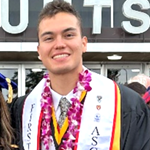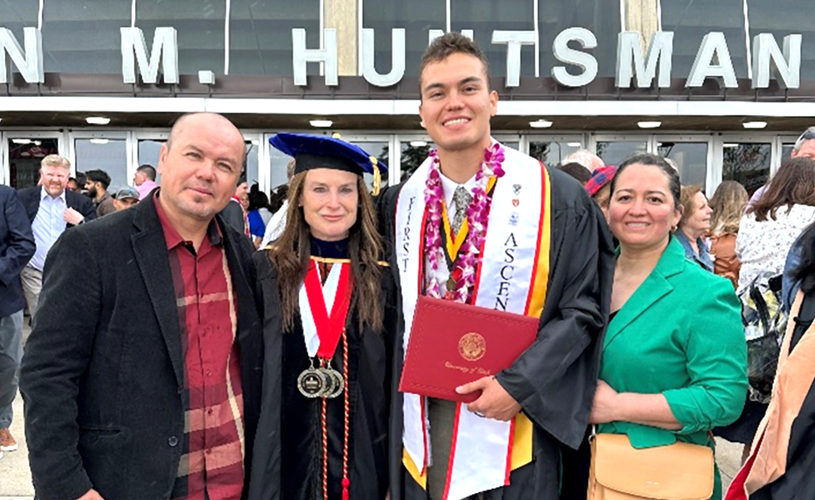Undergraduate Research at the David Eccles School of Business
What is Research?
As a first-generation student, I had to learn many new college-related words. One of those words was “research,” and professors commonly used it. I used the word casually to refer to finding an answer to my question. Questions such as “What are some good study habits for college students?” or “How can I maximize my chances of getting an internship?” Answers to these questions can easily be found through a quick Google search or by asking ChatGPT. After the first couple of weeks passed during my freshman year, I realized that professors meant something else when they said “research.”
Research in college is the process of generating new knowledge by asking a question and finding an answer. However, the questions are unanswered, and instead of using Google or ChatGPT, a structured process (also known as “methodology) is required to find the answers. A burning question I wanted to answer was “What are the systemic barriers for Latinx entrepreneurs to start and grow their businesses?” After reviewing the research articles of other people with the same question, I found that Latinx entrepreneurs have two main systemic barriers: 1) the lack of access to higher education and 2) the lack of access to capital funding. Not much literature exists on the lack of access to capital funding for Latinx entrepreneurs, so I narrowed my question down to “What are the systemic barriers for Latinx entrepreneurs in Utah to access capital in the form of loans?”
Finding Funding
To find an answer to my question, I first sought out financial support from the Office of Undergraduate Research to fund my research. This office is dedicated to supporting undergraduate researchers by providing a grant of $1,200 per semester for students that want to conduct their own research projects. The application for this grant, known as the Undergraduate Opportunity Program (UROP), only requires you to find a faculty mentor and write up a 2-3 page proposal. For my faculty mentor, I reached out to Professor Lyda Bigelow, Ph.D. from the Department of Entrepreneurship and Strategy. I enjoyed her honors strategic management (STRAT 3701) course and felt she would be a perfect mentor since she also works with entrepreneurs in the Master of Business Creation (MBC) program.
The Office of Undergraduate Research also provides paid 10-week summer research opportunities through the Summer Program for Undergraduate Research (SPUR). If you are interested in conducting summer research at a top business school outside of the state, you should look into the Program for Research in Markets and Organizations (PRIMO) fellowship at Harvard Business School, MIT Summer Research Program (MSRP) at Massachusetts Institute of Technology, and Summer Research Internship at Columbia Business School. If you apply for Harvard, MIT, or Columbia, the application will usually consist of submitting a resume, letter of recommendation, transcripts, short essay responses, and interviews. Contact your career coach in Business Career Services if you need help with resume reviews or practice interviews.
My Research
To discover the systemic barriers for Latinx entrepreneurs in Utah to access capital in the form of loans, I collected the contact information of over 27,000+ licensed construction contractors from the Utah Department of Occupational and Professional Licensing (DOPL) to distribute an IRB-approved 28-question Qualtrics survey. I focused on the construction industry because Latinx comprise a large percentage of the workforce. However, systemic barriers still exist for them to start their businesses in this industry. The survey collected owner demographic and firm data of contractors and their businesses. Using Python programming language, I ran descriptive statistics, regression analysis, and machine learning models to predict revenue performance and bank loan approvals.
The survey received a total of 1,974 responses from contractors. The results reveal that although Latinx represent 12.5 percent of contractors in Utah, they account for 7.2 percent of approvals for bank loans. The regression in revenue found that contractors generated $46,431.80 more if they had a business loan from a bank. The regression on loan approvals and machine learning models found that approval rates increased if they have more years of experience, apply for a General Contractor classification, hire a CPA-licensed accountant, register as a corporation instead of an LLC, earn a bachelor’s degree, form a relationship with loan officers, and generate more than $1 million in annual revenue. The results prove that banks and credit unions must mitigate the bias of loan officers and create equitable credit assessments for Latinx entrepreneurs. If you want to read more about my research, visit https://collections.lib.utah.edu/ark:/87278/s6e6916e.
Presenting at Conferences
The Eccles School supported my research because of its Equity, Diversity, and Inclusion (EDI) efforts to help Latinx minority entrepreneurs. With the help of Professor Bigelow and the EDI office at the Eccles School, I received funding to travel to the University of Wisconsin – Eau Claire and present my research at the National Conference for Undergraduate Research (NCUR). Attending NCUR 2023 was an amazing experience because I met other inspiring undergraduate researchers from across the country. Over 3,500+ undergraduate students and faculty attended the conference, and 13 undergraduates (including myself) represented the University of Utah. My favorite part of the conference was during my poster presentation, many Latinx undergraduate researchers approached me because they were thrilled that I was researching the Latinx community. We resonated on the lack of literature surrounding our Latinx community and empowered each other on our aspirations to pursue graduate school and increase the diversity of university faculty.
I thank Professor Lyda Bigelow and the Eccles School for supporting my research and helping me travel to Wisconsin!

Luis Ramirez is a David Eccles School of Business graduate. A First Ascent Scholar, he graduated Magna Cum Laude with degrees in Accounting HBS’23 and Information Systems BS’23.






